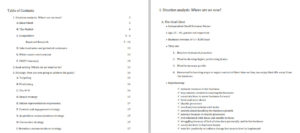Information Skills
First let me say that I fully agree with Mary Ellen Bates, author of
“In order to succeed in this business, you need to have experience as a researcher or be willing to subcontract out any project involving types of research in which you aren’t already an expert.”
This is because a successful Independent Information Professional uses more than one source to find information. And, with experience in the field, they have some expertise to draw on to locate other sources. And don’t forget, it’s not up to the client to pay for your learning curve.
Another reason experience as a researcher is recommended is because the Independent Information Professional needs to differentiate themselves from their competition – and if your only source for obtaining information is on the internet, then you’re not going to be any different than the next ‘internet researcher’ that your client receives a proposal from. At least, this is what I’ve found to be true.
I’ll be the first to tell you that most of the information I have been asked to find was not readily available on the free internet. I have used the telephone to interview people in an industry, the library to locate existing texts, premium online databases, as well as government databases. I’ve not had to research court records or patents in depth just yet, and neither of these is in my area of expertise. Though I do know expert researchers in these areas, and in other areas, and am confident that they would be available to me should I need them.
But once a project is in hand, it is important for me to say that some basic problem solving/information skills are necessary for the project to be completed successfully. The following will be familiar to most people as a problem-solving process:
Define the Information Problem and Identify the Information Needed.
 This is where the client has a question that needs to be answered, and the info pro must be sure that the question is the right one. This is also where communication skills are handy. For instance, a client called me wanting to know the number of franchisors in an industry and the contact information for each one. During the interview
This is where the client has a question that needs to be answered, and the info pro must be sure that the question is the right one. This is also where communication skills are handy. For instance, a client called me wanting to know the number of franchisors in an industry and the contact information for each one. During the interview
For instance, a client called me wanting to know the number of franchisors in an industry and the contact information for each one. During the interview process, it became apparent that the client actually needed to find answers to specific questions that only these franchisors could provide. The project went from finding contact information to creating interview questions and contacting each franchisor.
Determine All Possible Sources and Select the Best Sources
 Internet, premium databases, library, court house, telephone interviews, associations, periodicals, newspapers, magazines, technical bulletins, video, and on and on and on.
Internet, premium databases, library, court house, telephone interviews, associations, periodicals, newspapers, magazines, technical bulletins, video, and on and on and on.
If it can be printed on, saved to, recorded on then it is a viable source for information. So the ability to review all possible sources and select the best sources for a particular project is very important.
I’ll add here that my motto is “go to the original source if possible” to eliminate the misquotes, ‘missed in translation’ and ‘paraphrased/edited due to time/space constraints’ issues that will occur.
Find Information Within Sources and Extract Relevant Information
 Now that the sources have been determined, it’s time to find the information within those sources. Oh, and to only come out with relevant material. This is where the info pro’s skills at discerning quality vs. quantity, relevancy vs. off-topic come in handy. Sometimes it’s difficult to determine which information is relevant and which isn’t, but when you have to pay for the information it is vital that you’re able to decide what to keep and what to ignore. There is nothing more frustrating than paying for more information than you need, and realizing that the extra pieces you paid for just ate into your profit margin by 40% (yes, this can happen if you’re not careful).
Now that the sources have been determined, it’s time to find the information within those sources. Oh, and to only come out with relevant material. This is where the info pro’s skills at discerning quality vs. quantity, relevancy vs. off-topic come in handy. Sometimes it’s difficult to determine which information is relevant and which isn’t, but when you have to pay for the information it is vital that you’re able to decide what to keep and what to ignore. There is nothing more frustrating than paying for more information than you need, and realizing that the extra pieces you paid for just ate into your profit margin by 40% (yes, this can happen if you’re not careful).
Organize Then Present the Information
 The final format of any report is determined by the info pro and the client. Sometimes it’s simple spreadsheets with an executive summary, other times it’s a detailed look into an industry that requires graphs, supporting documentation, copies of existing material, combined into a booklet form that the client will then use to present to their company. Knowing how to organize the information so that it proceeds in a logical manner, as well as being able to present it so the client understands it can be the difference between you and a competitor.
The final format of any report is determined by the info pro and the client. Sometimes it’s simple spreadsheets with an executive summary, other times it’s a detailed look into an industry that requires graphs, supporting documentation, copies of existing material, combined into a booklet form that the client will then use to present to their company. Knowing how to organize the information so that it proceeds in a logical manner, as well as being able to present it so the client understands it can be the difference between you and a competitor.
It’s happened to me. I’ve been told that because my final presentation was legible, logical and easy to understand I would get the next project. This confirms for me that my attention to detail during the interview process results in quality outcomes that my client can count on.
Well, I think I've covered the basics. If you think I've missed something, please let me know.



